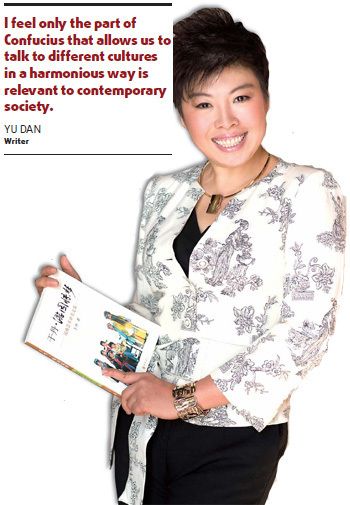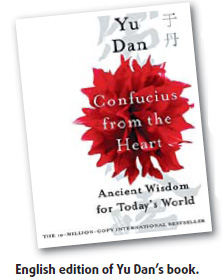
Dressed in a sharp, light summer frock, Professor Yu Dan sits in the cafeteria of a posh Beijing hotel, sipping from a largish glass of green tea. Just back from a book tour in London, where the English translation of her phenomenally-successful discourse on Confucian ideas was launched with due fanfare, the professor of media studies with Beijing Normal University-turned TV show hostess-turned bestseller-author is visibly glowing.
Booked for a month-long tour to promote the new English edition of her work - "Confucius from the Heart: Ancient Wisdom for Today's World," (translated by Esther Tyldesley and published by Pan Macmillan in collaboration with Zhonghua Books) - across Chinese mainland and abroad, Yu seems raring to go. Like her book, based on a series of lectures she presented on CCTV's "Lecture Room," she comes across as sensitive, easy-going, genial, sometimes digressive but hugely accessible.
After all, you don't sell four million copies everyday, as the Chinese original, "Thinking of the Analects of Confucius," has done in the three years that it has been around. This time Pan Macmillan has put out a modest 20,000 copies in English for Asia Pacific, according to Daniel Watts, who heads the publishing chain in the region, not counting the stocks earmarked for the UK, USA and Australia.
If only Confucius knew that the new Confucian boom sweeping through China was resting on the delicate shoulders of a woman!
The colossal political philosopher (551-479 BC) and ideologue who held sway over the culture and lifestyles of East Asians and the Chinese for centuries, before being temporarily banished from China during the "cultural revolution" (1966-76), is not known for taking a very charitable view of the second sex! Sample: "Women and people of low birth are hard to handle, if you let them get close, they presume and if you keep them at a distance, they resent it."
In both her show and the book, Yu says she followed the line taken by Confucian scholars Yang Guojun and Qian Mu, who felt women and the "low-born", who might be read as "children", were clubbed together, as they were often seen as similar in temperament.
"There are several interpretations and while catering to the mass media I don't have the time to list all of them, I choose what I think is the most appropriate," she adds.

Indeed, there are versions and versions of how Confucius might be read. Confucius is in the spotlight following an atavistic return after the hiatus during the "cultural revolution", and interpreters with diametrically opposite approaches are out to claim the palimpsest of spiritual and ethical discourse handed down by him.
Even as President Hu Jintao's key slogan, Goujian hexie shehui (to build a harmonious society), is informed by Confucian thought, resonating with the elder statesman's message on the eve of the Olympics of putting sportsmanship over nationalism, best-selling authors and academics are staking a claim on the Confucianist pie.
Several academics from Peking and Tsinghua universities are highly critical of Yu's work, seeing it as no more than a watered-down, feel-good, apolitical version of "The Analects." Professor Daniel Bell of Tsinghua University has dedicated an entire chapter of his book, "China's New Confucianism," (Princeton University Press), to Yu's work.
His charges are quite damning. Yu is accessible but problematic, says Bell. "She doesn't just dumb down but also depoliticizes, making use of Confucian language to promote Taoism." He also alleges that Yu's depoliticized version of Confucius falls in line with the government's policies. "At the end of the day, Yu's interpretation supports the status quo, which may not be the Confucian view," says Bell. "If Yu downplays social responsibility and political commitment she might not be committed to Confucian thought."
"But the depoliticizing was deliberate," protests Yu. "If we try to understand Confucius in terms of politics, we cannot learn much, because back in Confucius's time the foundations of society lay in feudal ethics whereas contemporary society is built on modern rules. There's no comparison between the two. I feel only the part of Confucius that allows us to talk to different cultures in a harmonious way is relevant to contemporary society."
As for the charge of supporting the status quo, she says, "I think we should understand and accept a society before trying to change it." Referring with admiration to the incident of Confucius bringing along three students from the southern provinces to deliberate on politics with the emperor, Yu suggests she can appreciate dissent.
"Only a person who understands humanity, accepts reality, has a sense of mission and can take responsibility for his fellows and his country would know how to bring about change."
At the end of the day, says Yu, her book and her lecture series are for the masses. "And I don't have the right to tell people what to do." Therefore, rather than taking only a political view, she says, she tries relating Confucian thoughts to one's everyday life experiences and explores how individuals might develop and work toward a more spiritually-inclined life, informed by wisdom.
Her engagement with Confucianism began rather early, at age 6, handheld by her father, a scholar of literature and philosophy. Since then Confucius has been growing on her. "When I was about 10, I loved lines like 'shi bu ke yi bu hong yi, ren zhong er dao yuan' (an educated gentleman cannot but be resolute and broad-minded for he has taken up a heavy responsibility and a long course).
"When I reached 30, I was taken by the expression, 'ren zhe bu you, zhi zhe bu huo, yong zhe bu ju' (the wise are not puzzled, the benevolent are not worried, the brave are not afraid). It told me to pay attention to my soul.
"When I reached 40 I had children as well as parents to look after, and 'lao zhe an zhi, peng you xin zhi, shao zhe huai zhi' (The elderly are comforted by him [the ideal person], friends trust him, juniors get cared for) appealed to me."
She does not feel that interpreting Confucius for the masses is a burden or an enormous responsibility. Nor does the fact that she is a huge commercial success - when Confucianism is essentially concerned with the virtues of non-material wealth - bother her.
"I believe in that which is gained beyond commercial success. I haven't changed a lot in the last three years. I still wear the skirt I bought two years ago, as it feels comfortable. After one has reached one's 40s, I don't think one's values change easily."
(China Daily June 9, 2009)